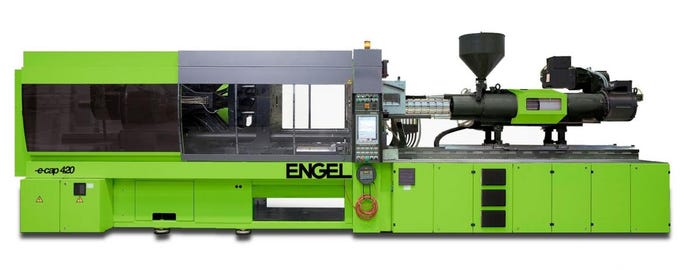Green machines: The future of packaging?
If you're familiar with Engel machines, you know that the company favors a green color theme. But green isn't just a bright color on an all-electric Engel e-cap injection molding machine—it appears the company has adopted a sustainable mentality for all of its packaging equipment.I recently attended Engel Packaging Days 2013 (April 24-25) at the company's North American headquarters in York, PA. It was a great event full of not only Engel machines, but also several presentations from various levels of the supply chain.
April 29, 2013
If you're familiar with Engel machines, you know that the company favors a green color theme. But green isn't just a bright color on an all-electric Engel e-cap injection molding machine—it appears the company has adopted a sustainable mentality for all of its packaging equipment.
I recently attended Engel Packaging Days 2013 (April 24-25) at the company's North American headquarters in York, PA. It was a great event full of not only Engel machines, but also several presentations from various levels of the supply chain.
 Something that stuck out to me during the packaging days was the talk of sustainability. Yes, I know sustainability is a big buzzword, especially in the packaging arena. Oftentimes the term is used to describe various materials and also large retailers and consumer goods companies looking to reduce packaging waste. But it's not as common to see sustainability as a driver for machines.
Something that stuck out to me during the packaging days was the talk of sustainability. Yes, I know sustainability is a big buzzword, especially in the packaging arena. Oftentimes the term is used to describe various materials and also large retailers and consumer goods companies looking to reduce packaging waste. But it's not as common to see sustainability as a driver for machines.
Christoph Steger, head of the Engel packaging business unit, said that in the packaging market there is currently a limitation of current production equipment to answer the growing demand on sustainable and greener production methods. Packaging, in particular, places many demands on all the components of an injection molding machine.
Echoing those thoughts was Joachim Kragl, director of advanced molding systems and processing for Engel North America, who said that all-electric machines should be a molders' "dream."
"All-electric is no doubt the future for packaging," he said. "It will happen one way or another, which is good for building a sustainable world."
The case for green machines
A 2010 study from the International Trade Administration showed how U.S. manufacturers of packaging machinery used sustainable manufacturing practices to respond to the multiple challenges they face in the world market.
Padraic Sweeney, an international trade specialist with the manufacturing and services unit of the International Trade Administration, wrote that the study refers to sustainable manufacturing as the use of processes that minimize negative environmental impacts; conserve energy and natural resources; are safe for employees, communities, and consumers; and are economically sound.
This is a practice that is driven worldwide by market forces and regulation and U.S. manufacturers are not exempt from those forces, they operate in global supply chains that face increasing demands for more sustainable products and services, he wrote.
While controlling waste is a focus by all members of the supply chain, Sweeney said that another driver for packaging machinery manufacturers to adopt sustainable practices is the push to cut energy use and greenhouse gas (GHG) emissions. For manufacturers doing business in the European Union and elsewhere, pressure to implement low-carbon manufacturing practices is strong and growing, he said.
At the same time, Sweeney said there appears to be a growing requirement for more sustainable packaging technology, the actual demand for sustainability has been slow to reach the packaging machinery industry. Some believed that packaging machinery consumes too little energy to be significant.
Still, it appears various players in the industry are working toward "greener" machines. PlasticsToday's Karen Laird reported in 2012 that Blue Competence, the sustainability initiative launched three years ago by the VDMA German Engineering Federation is now also supported by the plastics and rubber machinery manufacturers association, with nearly 40 machinery companies in the sector having already joined the initiative.
"Sustainability is a priority," said Arburg's Helmut Heinson. "With us it starts with the design of the product and in putting in place a sustainable production process." Arburg's manufacturing plant is certified under ISO 500001, which provides a framework for improving energy performance, including energy efficiency, use and consumption.
Do you believe sustainability is a focus for packaging machinery makers?
About the Author(s)
You May Also Like


